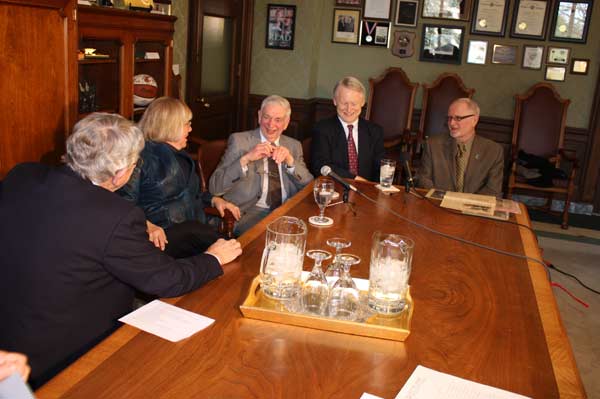When voting age was lowered to 18
Two of Secretary Reed’s passions – history and voting – literally came together in his office Monday as he reminisced with other key players in Washington’s role to allow 18-year-olds to vote.
Reed joined former Gov. Mike Lowry, Ian McGowan, Mark Brown and Wendy Bowen in a roundtable discussion in the Secretary’s office to relive memories of their successful effort to persuade the state Legislature in 1971 to ratify the U.S. Constitution’s 26th Amendment, which lowered the voting age from 21 to 18.
At that time, Lowry was the Senate Ways and Means Committee chief of staff, McGowan worked as a staffer for U.S. Sen. Warren Magnuson, Brown was the coordinator for the statewide campaign in 1970 to lower the voting age to 19, and Bowen a University of Washington student lobbyist.
For two generations of Washington voters, it might be hard to imagine a time when 18 year olds were not allowed to vote. But that was the case until the 26th Amendment was ratified. The issue of lowering the voting age to 18 came to a head during the Vietnam War. Advocates argued that if it was OK for 18-year-olds to be drafted into service and sent into combat, they were old enough to vote.
As co-chairs of the “Vote-19” campaign, Reed and Lowry succeeded in persuading the 1970 Legislature to send a state constitutional amendment (here is a story about Washington political leaders supporting the amendment, HJR 6) to Washington voters to lower the voting age to 19. But the measure was narrowly rejected that November following the Kent State uprising and the closure of I-5 in Seattle by UW students.
But proponents didn’t have to wait long for their dream to come true. On March 23, 1971, Congress passed the 26th Amendment, thus sending it to the states for ratification. And it didn’t take long for the necessary number of states (three-quarters, or 38) to ratify it.
In fact, Washington was one of the five states (Connecticut, Delaware, Minnesota and Tennessee were the others) to ratify on the same date that Congress proposed it. (Reed and Lowry teammed up again to co-chair the effort to ratify the 26th Amendment in Washington State.) It was ratified nationally on July 1 that year when North Carolina and Oklahoma gave their OK. At 100 days, it was the shortest length of time for any federal constitutional amendment to be ratified.
